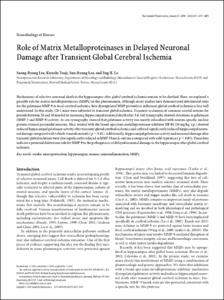Role of Matrix Metalloproteinases in Delayed Neuronal Damage after Transient Global Cerebral Ischemia
- Keimyung Author(s)
- Lee, Seong Ryong
- Department
- Dept. of Pharmacology (약리학)
- Journal Title
- Journal of Neuroscience
- Issued Date
- 2004
- Volume
- 24
- Issue
- 3
- Keyword
- stroke; neuroprotection; hippocampus; mouse; neuroinflammation; MMPs
- Abstract
- Mechanisms of selective neuronal death in the hippocampus after global cerebral ischemia remain to be clarified. Here, we explored a
possible role for matrix metalloproteinases (MMPs) in this phenomenon. Although many studies have demonstrated detrimental roles
for the gelatinase MMP-9 in focal cerebral ischemia, how dysregulated MMP proteolysis influences global cerebral ischemia is less well
understood. In this study, CD-1 mice were subjected to transient global ischemia. Transient occlusions of common carotid arteries for
periods between 20 and 40 min led to increasing hippocampal neuronal death after 3 d. Gel zymography showed elevations in gelatinase
(MMP-2 and MMP-9) activity. In situ zymography showed that gelatinase activity was mostly colocalized with neuron-specific nuclear
protein-stained pyramidal neurons. Mice treated with the broad-spectrum metalloproteinase inhibitor BB-94 (50 mg/kg, i.p.) showed
reduced hippocampal gelatinase activity after transient global cerebral ischemia and suffered significantly reduced hippocampal neuronal
damage compared with vehicle-treated controls ( p 0.01). Additionally, hippocampal gelatinase activity and neuronal damage after
transient global ischemia were also significantly reduced inMMP-9knock-out mice compared with wild-type mice ( p 0.05). These data
indicate a potential deleterious role for MMP-9 in the pathogenesis of delayed neuronal damage in the hippocampus after global cerebral
ischemia.
- Keimyung Author(s)(Kor)
- 이성용
- Publisher
- School of Medicine
- Citation
- Seong-Ryong Lee et al. (2004). Role of Matrix Metalloproteinases in Delayed Neuronal Damage after Transient Global Cerebral Ischemia. Journal of Neuroscience, 24(3), 671–678. doi: 10.1523/JNEUROSCI.4243-03.2004
- Type
- Article
- ISSN
- 0270-6474
- Appears in Collections:
- 1. School of Medicine (의과대학) > Dept. of Pharmacology (약리학)
- 파일 목록
-
-
Download
 oak-aaa-3062.pdf
기타 데이터 / 525.85 kB / Adobe PDF
oak-aaa-3062.pdf
기타 데이터 / 525.85 kB / Adobe PDF
-
Items in Repository are protected by copyright, with all rights reserved, unless otherwise indicated.